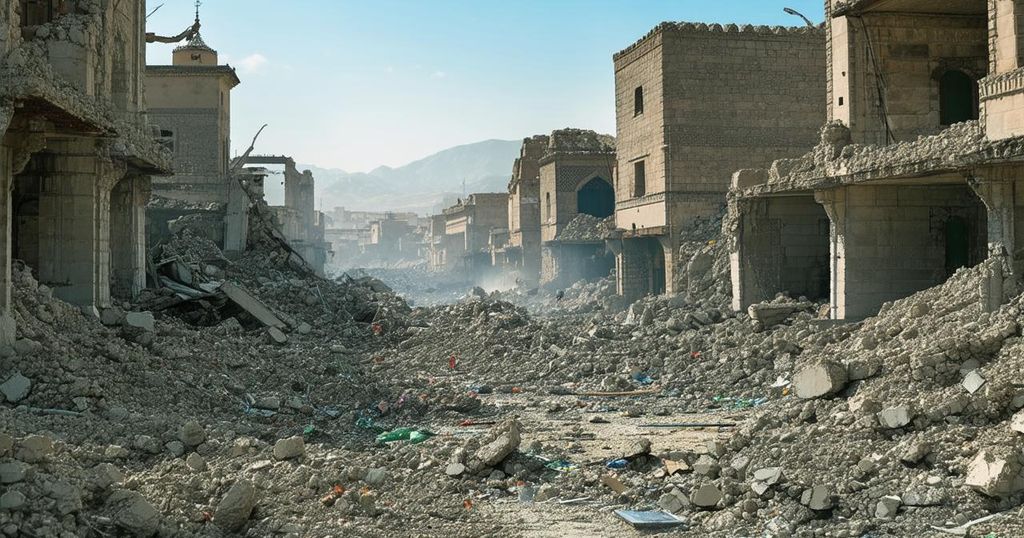Michaela Creel, an international affairs and cultural anthropology major, participated in recovery efforts following the September 2023 earthquake in Morocco while working with the High Atlas Foundation. Her duties included communications and community engagement, significantly contributing to the Foundation’s mission of sustainable development, which emphasizes agriculture, women’s empowerment, and water systems management. Her immersive experience in local culture deepened her understanding of community resilience and sustainable practices.
Michaela Creel, a student majoring in international affairs and cultural anthropology, engaged in significant recovery efforts after the devastating earthquake that struck Morocco in September 2023. During her co-op with the High Atlas Foundation, a non-profit organization focused on sustainable development, she visited farming communities situated in the High Atlas mountain region, which have historically cultivated crops such as olives and almonds. This region was severely impacted by the earthquake, which not only disrupted farming activities but also complicated ongoing efforts towards sustainable agricultural practices. The High Atlas Foundation, founded by former Peace Corps volunteers in 2000, prioritizes community involvement in its development initiatives. Creel was drawn to this co-op opportunity as it offered a unique blend of her academic interests and the chance to engage in hands-on community work, rather than traditional desk duties. She noted, “It’s an interesting mix of my majors,” highlighting how the experience aligned with both her cultural and international studies. The organization’s operations are built upon three foundational pillars: agriculture, women’s empowerment in the workforce, and water resource management. Creel described the Foundation’s commitment to planting over 5 million trees and producing 2 million saplings annually, specifically aimed at assisting farmers across 15 provinces. Furthermore, the High Atlas Foundation conducts workshops to support women in entrepreneurship and develops sustainable water systems. In the aftermath of the earthquake, Creel’s contributions largely revolved around communication strategies to articulate the Foundation’s recovery efforts. Her roles involved documenting activities such as sapling distribution, interactions with local farmers, and visiting markets to engage with women artisans. Notably, she created an interactive digital tour for one of the Foundation’s tree nurseries, a task that required her to learn coding skills for the first time. Creel immersed herself in the local culture during her five-month stay in Medina, embracing the friendly community environment that encouraged her integration. She forged connections with local residents, such as a fruit stand owner who generously provided complementary produce and colleagues who invited her to partake in Ramadan traditions. Through these experiences, she gained a profound appreciation for Moroccan culture, which she asserts would not have been as vivid had she merely participated in a traditional study abroad program.
The High Atlas region of Morocco has a long history of agricultural practices that are integral to the local economy and culture. The area specializes in traditional crops, notably olives and almonds, which have sustained local families for generations. However, the recent earthquake posed significant threats to both livelihoods and ongoing sustainable development efforts aimed at adapting farming practices to contemporary challenges. Non-profit organizations, like the High Atlas Foundation, seek to mitigate the impacts of such disasters while promoting community-led initiatives that align with local needs and sustainability goals. The Foundation’s work reflects a commitment to fostering long-term, sustainable agricultural practices through active community participation, particularly in recovery efforts.
In conclusion, Michaela Creel’s co-op experience with the High Atlas Foundation illuminated the resilience and determination of Moroccan farming communities in the wake of a natural disaster. Her involvement exemplifies the power of community-based approaches to development, particularly in contexts that demand urgent recovery. Through hands-on engagement and effective communication, Creel not only contributed to the ongoing recovery efforts but also enriched her understanding of Moroccan culture and the intricacies of sustainable development practices. The High Atlas Foundation’s dedication to agriculture, women’s empowerment, and responsible water management serves as a model for effective social impact initiatives within vulnerable communities.
Original Source: news.northeastern.edu






